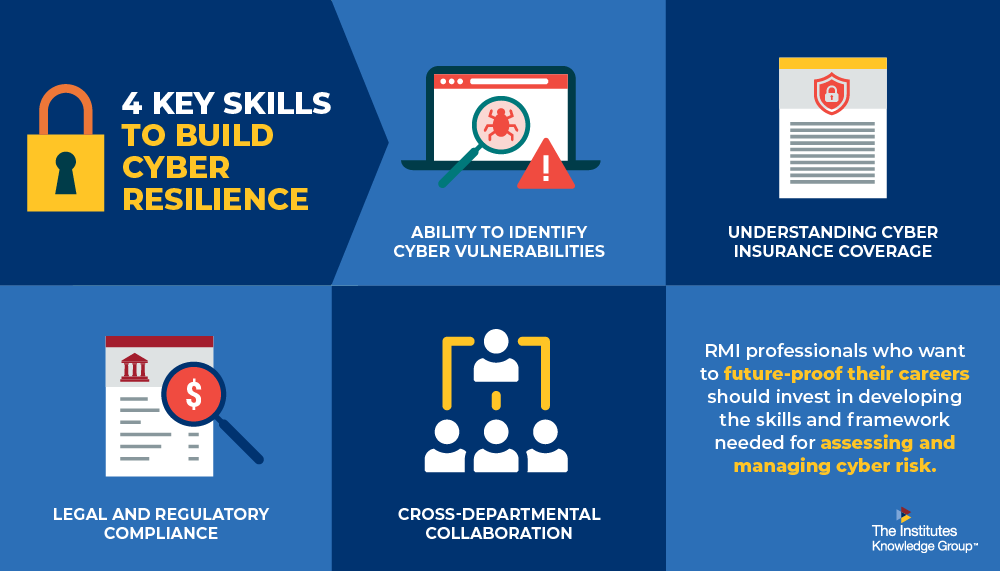Risk Management Strategies
Managing Cyber Risk: The In-Demand Skillset You Need to Stay Ahead of the Curve
As cyber-attacks grow in frequency and sophistication, managing cyber risk has never been more critical for organizations of all sizes. From ransomware to large-scale data breaches, everyone is vulnerable—especially risk management and insurance (RMI) professionals who handle sensitive business and client data.
That’s why it’s key to stay ahead in managing cyber risk. Those who are proficient in cyber resilience can protect their organizations and clients from emerging threats while standing out as valuable assets to employers.
The Evolving Cyber Threat Landscape
Cyber risks are continuously evolving, with new threats emerging every day. In fact, the average cost of a data breach has reached $4.45 million—an all-time high and a 15% increase over the last three years. What was once the concern of IT departments alone has become a top priority for entire organizations. High-profile data breaches, ransomware attacks, and cyber espionage are just a few examples of the increasingly complex security risks facing businesses today.
RMI professionals must stay informed about these emerging threats to make accurate risk assessments and protect sensitive data. The first step? Learn what you’re looking for.
Courses like ACRM 401: Effectively Managing Cyber Risk from The Institutes Designations’ Associate in Cyber Risk Management™ (ACRM™) provide a deep dive into evolving cyber threats and how to assess vulnerabilities to mitigate their potential impact. Remember: risk mitigation is not just about reacting to attacks; it’s about preventing potential threats before they occur.
Why Managing Cyber Risk is a Must-Have Skillset for All RMI Professionals
Non-IT professionals are increasingly responsible for understanding and mitigating cyber risks. This is in part because these threats have grown beyond technical issues to affect the entire organization. From financial losses, to operational disruptions, to reputational damage, the consequences of a cyber-attack can be devastating. Despite the risks, 87% of C-Level executives believe their companies lack adequate protection.
RMI professionals have always played a crucial role in evaluating insurance coverage, identifying organizational vulnerabilities, and implementing risk mitigation strategies. So it’s no surprise that as cyber threats become more prevalent, their responsibilities expand to help build a cybersecurity risk management process as well.
Their knowledge of organizational structures, operational risks, and financial exposures makes them key players in developing a comprehensive cyber risk management strategy. For example, underwriters may need to understand cyber insurance policies and coverage gaps. Risk managers must collaborate with IT and other departments to build an organization-wide defense plan against potential risks.

4 Key Skills Needed to Build Cyber Resilience
Developing the risk management framework and skills needed for assessing and managing cyber risk is essential for those who want to future-proof their careers. Employers are increasingly seeking out those who cannot only identify cyber vulnerabilities, but also work collaboratively to develop robust data security defenses. Here are four key skills you need to build cyber resilience:
Ability to Identify Cyber Vulnerabilities
The first step in managing risk is identifying where an organization is most vulnerable. This can involve data storage, outdated securities measures, and even human errors.
Understanding Cyber Insurance Coverage
Having an in-depth knowledge of different types of coverage and knowing how to fill coverage gaps is crucial for comprehensive risk management.
Legal and Regulatory Compliance
Staying current on cyber regulations is no longer just a best practice; it’s a necessity. New regulations around data privacy, like the European Union's GDPR and California's CCPA, directly impact how organizations manage cyber risks.
Cross-Departmental Collaboration
Cyber risk management, once seen as an information technology (IT) issue, is no longer siloed to a single security team. Rather, it is an enterprise risk that requires collaboration across departments to create comprehensive and effective strategies.
Looking Towards the Future of Risk Management
In today’s rapidly changing threat landscape, mastering cyber risk management is quickly becoming an essential skillset for every RMI professional. By developing the skills to manage cyber risk, you can protect your organization and your clients from catastrophic events while positioning yourself as an indispensable asset.
The Institutes Designations’ new Associate in Cyber Risk Management™ (ACRM™) is designed to help you build lasting cyber resilience. It will equip you with an adaptable framework to stay ahead of emerging cyber threats and broaden your cyber risk management perspective beyond IT.
Take the next step in your career and become a leader in assessing, mitigating, and managing cyber risk by earning your Associate in Cyber Risk Management™ (ACRM™) today!
